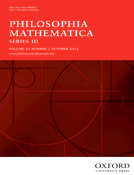-
Views
-
Cite
Cite
Gregory Landini, Michael Potter Tom Ricketts, eds. The Cambridge Companion to Frege. Cambridge: Cambridge University Press, 2010. ISBN 978-0-521-62479-4. Pp. xvii+639, Philosophia Mathematica, Volume 20, Issue 3, October 2012, Pages 372–387, https://doi.org/10.1093/philmat/nks020
Close - Share Icon Share
Extract
The expressed purpose of the series of Cambridge companions to major philosophers is to bring together an international team of scholars to write essays that elucidate major philosophical ideas in a way that generates a lasting resource accessible to both specialists and non-specialists alike. To apply this to the philosophy of Frege is a herculean task. Frege was first and foremost a mathematician. He was working amid a philosophically tumultuous period in his field. Russell colorfully (and tendentiously) describes it as a time when mathematicians finally discovered that ‘mathematics may be defined as the subject in which we never know what we are talking about, nor whether what we are saying is true.’ In Russell's view, it is relation and order, not magnitude, that is the proper subject of the fields of mathematics. Frege's works are engagingly difficult and wonderfully controversial. The Companion to Frege is a laudable attempt to explain some of the complicated contours of the landscape encountered when it comes to understanding the unique stand Frege takes on the issues.



